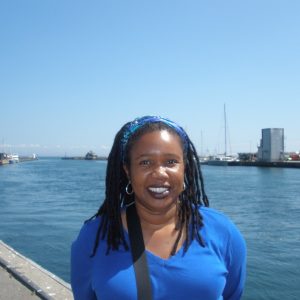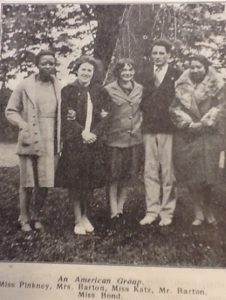Walking through a cemetery and noticing a name that seemed out of place led Ethelene Whitmire to a surprising discovery – and has provided the basis for her latest line of research.
 Etheline Whitmire in Kerteminde, Denmark, where African American painter William Henry Johnson lived in the 1930s.
Etheline Whitmire in Kerteminde, Denmark, where African American painter William Henry Johnson lived in the 1930s.
“In the summer of 2013, I spent six weeks in Copenhagen,” explains Whitmire, professor in the School of Library and Information Studies at the University of Wisconsin–Madison. “I lived near Assistens Kirkegård, a cemetery where Hans Christian Andersen is buried. I would take a shortcut to my favorite café. On the path back to my apartment, I saw a prominent headstone with a very non-Danish name.”
The stone read “Ben Webster, 1909-1973.”
“I discovered that Ben Webster was an important African American jazz musician who lived in Copenhagen,” she says. She further learned that Webster – a saxophonist who had played with Duke Ellington and others – was among seven African American jazz musicians buried in Denmark.
“The more I visited the country, the more I learned about other African Americans who had a connection with Denmark. I wanted to learn more and to tell their stories,” she says.
Whitmire has received a 2016-17 Fulbright Scholar award to conduct research during the fall 2016 semester for her book project, The African American Presence in Denmark in the 20th Century. She aims to address two questions: Why did African Americans go to Denmark? What were their experiences as African Americans in Denmark?
“This project extends the geographic boundaries of the transnational experiences of African Americans,” she says. “There are many books about African Americans in Paris, but I believe the story about African Americans in Denmark is equally important.”
She explains: “I learned that many African Americans studied, performed, visited, and lived in Denmark, including social workers, educators, dancers, diplomats, singers, jazz musicians, visual artists, journalists, writers, a scientist and one professional baseball player.
 This image shows Mr. and Mrs. John Barton with two African American women, Floria Pinkney and Wenonah Bond studying at the International People’s College in Elsinore, Denmark in 1930. The Bartons taught at the school. They left before Denmark was invaded during World War II and John Barton taught at UW-Madison for 25 years until he retired in 1962.
This image shows Mr. and Mrs. John Barton with two African American women, Floria Pinkney and Wenonah Bond studying at the International People’s College in Elsinore, Denmark in 1930. The Bartons taught at the school. They left before Denmark was invaded during World War II and John Barton taught at UW-Madison for 25 years until he retired in 1962.
“Many of them saw Denmark as a utopia where they could escape from the racial discrimination in the United States or that they could borrow from Danish social programs, like the folk schools and cooperative movement, to uplift the lives of African Americans in the early part of the 20th century.”
She also sees a historic connection: “Many of the African Americans in my study decided to go to Denmark because of their connection with the U.S. Virgin Islands – the former Danish West Indies. Denmark was part of the slave trade and they took people from Ghana and enslaved them on the Danish West Indies.”
Whitmire talks about how her connection with Denmark started.
“Normally, I travel abroad for conferences, but when I first went to Denmark in May and June 2010, it was the rare time I was not attending a conference. I was writing my first book, Regina Anderson Andrews, Harlem Renaissance Librarian (University of Illinois Press, 2014), and I used the time as a writing retreat.”
Since then, she has returned to the Scandinavian country 10 times, including the last six summers.
“I did not know anyone when I first went, but now I have many friends there,” she says.
Whitmire earned her Ph.D. in higher education from the University of Michigan (2001). Her areas of interest include the history of African American women librarians (Regina Andrews, Audre Lorde).
At UW–Madison, she also is affiliated with the Department of Afro-American Studies, Scandinavian Studies, Department of Gender and Women’s Studies, and the Center for European Studies.
Follow Whitmire’s project on social media:
Instagram:https://www.instagram.com/ethelene_whitmire/
Twitter:https://twitter.com/EtheleneW